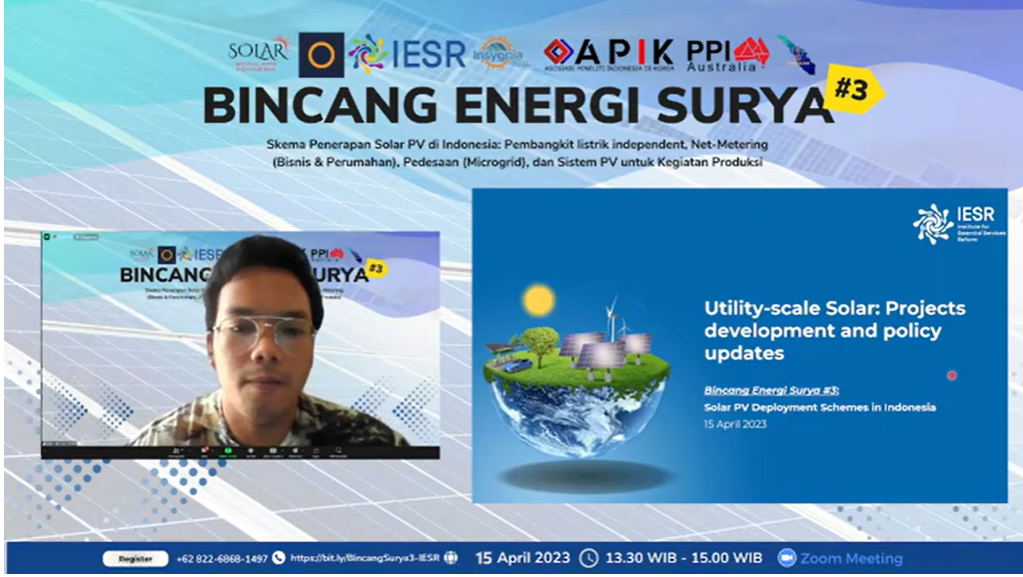Jakarta, April 15, 2023 – A careful planning strategy is essential to encourage the use of solar energy in the electricity system. The Government of Indonesia and PLN (the national power utility) released the new Electricity Business Plan (RUPTL) 2021-2030, which sets out Indonesia’s future power capacity by increasing the number of New Renewable Energy (EBT) generators. The target of the EBT mix in the National Electricity General Plan (RUKN) is around 23% in 2025. It was stated by Alvin Putra Sisdwinugraha, Researcher of Electricity Systems and Renewable Energy at the Institute for Essential Services Reform (IESR), in the Solar Energy Talk #3 events, the results of collaboration between Solar Scholars Indonesia (SSI), IESR, PPI Australia, Korean Indonesian Research Association (APIK), Insygnia, and Solarin.
“Referring to the RUPTL, solar energy will play an important role in Indonesia’s electricity to achieve net zero emission (NZE), while the utility-scale is still the biggest contributor. However, this is not enough for Indonesia to pursue its 2050 decarbonization target,” Alvin Putra Sisdwinugraha stated.
Several potential clusters within the RUPTL are the mining sector, the tourism sector, the fisheries sector, Solar Power Plants (rooftop solar PV), floating solar PV, and other sectors with a total capacity of up to 2.1 Giga Watt (GW). Regarding floating solar PV, Alvin said the issuance of Minister of Public Works Regulation No. 6 of 2020 is a breath of fresh air for developing renewable energy in Indonesia because it allows the use of space in reservoir/dam areas of around 5% at normal water levels. Regarding these regulations, The Ministry of Energy and Mineral Resources (ESDM) has mapped out the potential for floating PLTS of 28.4 GW, with 4.8 GW of existing hydropower.
“Although the potential is quite large, unfortunately, there are no specific technical regulations regarding the safety of the dam/reservoir. This can be reflected in the development of a floating Solar PV in Cirata, West Java, which a private developer is carrying out,” he explained.
On the other hand, to encourage the use of solar energy, the government has signed Presidential Regulation (Perpres) Number 112 of 2022 concerning accelerating the development of renewable energy for electricity supply. This regulation strengthens the government’s commitment to energy transition in achieving the NZE. One of the things discussed in the Presidential Decree, said Alvin, is that the price for electricity from PLTS is based on the highest benchmark price.
“Although it depends on the bidding scheme that will be implemented by the Government and PLN, pricing for PLTS based on the highest price benchmark is expected to provide room for more small-capacity PLTS to develop,” he remarked.

